This post was originally posted on the Formhub blog in October 2012. I have made some changes to the text and added some pictures of my own.
As a part of the project to support the Liberian government in the preparation of their energy sector Master Plan, Modi’s Lab conducted a two-week training to prepare key government staff from four different Liberian government organizations in the use of mobile rapid data-gathering tools to estimate the urban and rural energy demand in the country. I had the opportunity to join the team to support on this 2-week long training in Monrovia.
After the end of the civil war in 2003, the Liberian power sector was largely destroyed due to warfare. Currently less than 1% of Liberia’s population has access to electricity. With the exception of independent power producers (IPP) and limited municipal mini-grids in Robertsport, Gbarnga, and Sanniquellie, Liberia’s rural (non-Monrovia) population has no access to electricity. Access to modern energy will be a critical element if Liberia is to restart the process of economic and social development. The cost to develop the sector is expensive, minimizing this costs is a complex problem that requires taking into consideration different technologies available, different network architectures and the penetration level within a community is essential to planning. To identify the optimal solution to this problem it is essential to gather sufficient spatial data to estimate the residential, commercial and industrial spatial power demand.
 For two weeks, 20 government employees from the Ministry of Lands, Mines and Energy (MLME), the Liberian Institute of Statistics and Geographic Information Services (LISGIS), the Rural and Renewable Energy Agency (RREA) and the Liberian Electricity Company (LEC) participated in a practical training that allowed these different agencies to understand their different data needs and collaborate in the design and authoring of expert surveys. The intensive 8 day training covered all aspects of Formhub, the mobile rapid data gathering technology adapted by this Earth Institute engineering lab that focuses on developing and implementing engineering solutions for the developing world. The training included the excel syntax to author mobile surveys, the use of Android phones to conduct surveys and the steps to clean, process the resulting information and analyze it with the use of analytical software such as GIS and statistical software packages.
For two weeks, 20 government employees from the Ministry of Lands, Mines and Energy (MLME), the Liberian Institute of Statistics and Geographic Information Services (LISGIS), the Rural and Renewable Energy Agency (RREA) and the Liberian Electricity Company (LEC) participated in a practical training that allowed these different agencies to understand their different data needs and collaborate in the design and authoring of expert surveys. The intensive 8 day training covered all aspects of Formhub, the mobile rapid data gathering technology adapted by this Earth Institute engineering lab that focuses on developing and implementing engineering solutions for the developing world. The training included the excel syntax to author mobile surveys, the use of Android phones to conduct surveys and the steps to clean, process the resulting information and analyze it with the use of analytical software such as GIS and statistical software packages.
The practical nature of the training allowed government institutions to select a current need for collecting data, defining the set of questions required to study the issue at hand and pilot the survey to test it before making a full scale data gathering effort. For example, RREA designed a survey to understand the energy needs of rural populations in their use of charcoal and other biomass to help plan the introduction of fuel-efficient cook stoves.
Other efforts where aimed at understanding the operation of Independent Power Providers, entrepreneurs that sell electricity produced by diesel generators. Because the government has not been able to provide energy to all Liberians, IPP’s cover a very important need, but because of the unregulated nature of their business usually provide a service that is expensive, unreliable and that does not contribute to the extension and improvement of the power grid of the country. Piloting the survey in the field with real IPP’s allowed the different teams in the field to grasp the use of this new technology but also to understand the problems that enumerators face on the field and modify the survey to better respond to the data analysis needs.
Doing a pilot was very illustrative for the government officials but also for the Columbia University team. The scale of operation of some of these power producers goes well beyond what we can consider a micro-grid. Some had a customer base of over 150 customers, with circuit breakers to cap energy consumption to usually 1 amp but up to 10-15 amps for businesses. These IPP are really making a profit by charging flat-fees of up to 45$ per Amp, the scale is large and there is absolutely no use of safety standard for the wiring or the equipment.
During the training we were exposed to the common difficulties that Liberians experience everyday. Common power outages and tension spikes affected the equipment and created some minor but bothersome disruptions several times a day (try to charge 40 Android smartphones with power outages every hour). Every time the A/C stopped working, I would brace myself for the heat that 25 people with their respective laptops would release in a small conference room. Low bandwidth, recurrent inaccessible Internet forced us to be creative in our methods, pushed our resourcefulness to the limits.
What was interesting was putting the whole technological platform to the test of least developing country conditions, many innovations in the field of ICT4D work great in the big cities of the U.S. but fail completely as soon as you try them in least developed countries. We are proud to announce that Formhub was successful in facing the challenge of functionality under stressful situations (reduced bandwitdth, power shortages, no cell phone signal).
The last couple of days we visited each one of the organizations to make sure of what data exists and which are the data gaps. All institutions were provided with as many as 9 Android smartphones to start piloting their surveying efforts. The utility company wanted to start working right away on their Cross Border Needs Assessment, 18 communities close to the border with Ivory Coast will have access to power coming from the neighboring country. Understanding the power demand of such rural communities will be extremely valuable to parameterize the Earth Institute modeling efforts and improve the accuracy of the different scenarios for the energy grid planning.
Although data collection is a fundamental step for planning, the analysis of this data will also be a challenge, capacity building of these institutions in this area will be fundamental to truly make a difference in access to modern energy services in Liberia.
This technology has a very strong potential to truly increase work productivity in several ways. Not only is the possibility to obtain field data in large amounts real. Indeed any project can benefit from accurate planning based on actual facts. On top of the long term benefits the technology also permits to reduce the efforts of conducting a survey. For example, data clerks that digitize the paper surveys results can now be sent to the field to collect more data.
During our stay in Liberia we learned that the World Bank was able to collect information on all water points across the nation using 70 LG Optimus Smartphones during 30 days, a project called FLOW. The Formhub platform is still being improved everyday and Columbia University is hoping that it will allow developing countries to make large national infrastructure facilities inventories possible with very little investment.
Open Data Kit and Formhub are both Open Source tools, if you are interested in learning more about this tool please refer to the following short presentation to get an idea of what you can do with this amazing tool. After my return from Liberia I helped Modi’s Laboratories to improve it’s online tutorial.

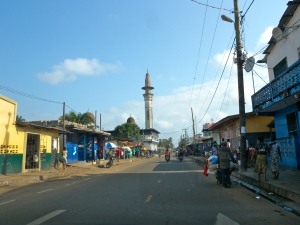



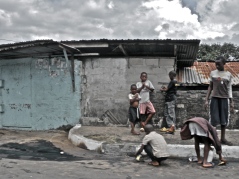







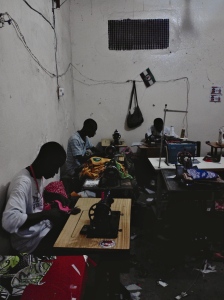


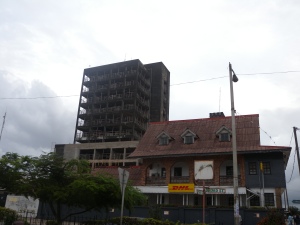
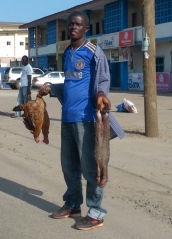

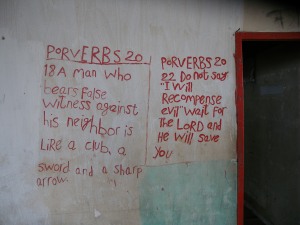



No hay comentarios:
Publicar un comentario